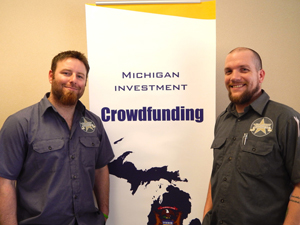Michigan economic developers, local communities of all sizes, chambers of commerce, and any Michigan resident who loves the place they live should investigate MILE, the Michigan Invests Locally Exemption, or PA264 of 2013. With this law, Michigan became the leader of a growing number of states to take advantage of an intrastate exemption in federal law that allows us to become investors in our own communities. It’s called investment crowdfunding, and it’s changing the game in businesses across the globe.
Last December Governor Snyder signed PA264 into law, and brought a powerful economic development tool to all Michigan communities. The tool allows local businesses, new and existing, to reach out to their own community to raise money – capital – that can help start new or grow existing businesses. The tool is great for business, but also great for communities and investors, and under MILE, all Michigan residents can be investors.
Economic development in local communities has always been an uphill battle; we are impacted by forces beyond our control, and access to capital to start or grow businesses was managed by a relatively few businesses, organizations, and individuals. As regular citizens, there was virtually no way we could positively impact economic development except to shop local – a very important tool! – but a very slow and imprecise method of building a local economy.
MILE changes the equation. Now, regular Michigan residents (not just the wealthiest 7%) can invest in businesses in their own communities, support new and existing businesses, drive investment, employment, AND get a return on their investment! MILE allows those regular investors – known as non-accredited investors in federal investor-speak – to invest up to $10,000 in any single business in any one year, with no limit on the number of businesses an investor supports. Existing Michigan businesses with audited financials may raise up to $2 million dollars from non-accredited investors by pooling their investments together, and existing or new businesses without audited financials can raise up to $1 million dollars from non-accredited investors – in both cases, investment crowdfunding!
 Sounds good, but can it work in real life? It can and it is. In Michigan, the first business to use MILE raised $175,000, as part of a capital raise of roughly $350,000 that will allow the Tecumseh Brewing Company to open its brand new micro-brewery and restaurant in historic downtown Tecumseh in October 2014. Where did the rest of the money come from? A traditional commercial bank loan from OSB Community Bank matched the funds raised from the crowdfunding effort; this bank recognized the value of helping to establish a new business that already had broad support from the community.
Sounds good, but can it work in real life? It can and it is. In Michigan, the first business to use MILE raised $175,000, as part of a capital raise of roughly $350,000 that will allow the Tecumseh Brewing Company to open its brand new micro-brewery and restaurant in historic downtown Tecumseh in October 2014. Where did the rest of the money come from? A traditional commercial bank loan from OSB Community Bank matched the funds raised from the crowdfunding effort; this bank recognized the value of helping to establish a new business that already had broad support from the community.
You are going to see more deals like this coming to Michigan in the next months. Communities from all over the state are working diligently to understand and apply this new tool to their own economic development efforts. These communities are interested in controlling their own destinies, in starting and supporting their own businesses, and in making their own communities stronger. MILE + Investment Crowdfunding + Local Investing – they allow us to invest in those places we know best and love most.
